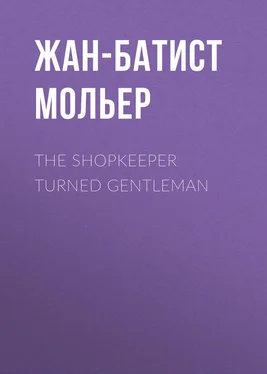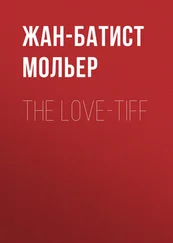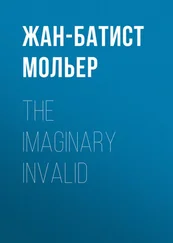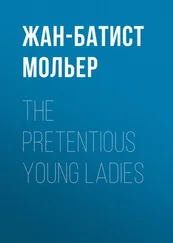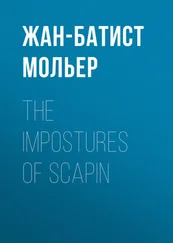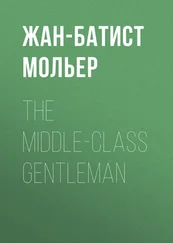Жан-Батист Мольер - The Shopkeeper Turned Gentleman
Здесь есть возможность читать онлайн «Жан-Батист Мольер - The Shopkeeper Turned Gentleman» — ознакомительный отрывок электронной книги совершенно бесплатно, а после прочтения отрывка купить полную версию. В некоторых случаях можно слушать аудио, скачать через торрент в формате fb2 и присутствует краткое содержание. Жанр: foreign_antique, foreign_prose, foreign_dramaturgy, на английском языке. Описание произведения, (предисловие) а так же отзывы посетителей доступны на портале библиотеки ЛибКат.
- Название:The Shopkeeper Turned Gentleman
- Автор:
- Жанр:
- Год:неизвестен
- ISBN:нет данных
- Рейтинг книги:3 / 5. Голосов: 1
-
Избранное:Добавить в избранное
- Отзывы:
-
Ваша оценка:
- 60
- 1
- 2
- 3
- 4
- 5
The Shopkeeper Turned Gentleman: краткое содержание, описание и аннотация
Предлагаем к чтению аннотацию, описание, краткое содержание или предисловие (зависит от того, что написал сам автор книги «The Shopkeeper Turned Gentleman»). Если вы не нашли необходимую информацию о книге — напишите в комментариях, мы постараемся отыскать её.
The Shopkeeper Turned Gentleman — читать онлайн ознакомительный отрывок
Ниже представлен текст книги, разбитый по страницам. Система сохранения места последней прочитанной страницы, позволяет с удобством читать онлайн бесплатно книгу «The Shopkeeper Turned Gentleman», без необходимости каждый раз заново искать на чём Вы остановились. Поставьте закладку, и сможете в любой момент перейти на страницу, на которой закончили чтение.
Интервал:
Закладка:
Molière
The Shopkeeper Turned Gentleman
PERSONS REPRESENTED
MR. JOURDAIN.
CLÉONTE, in love with LUCILE.
DORANTE, a count, in love with DORIMÈNE.
COVIELLE, servant to CLÉONTE.
A MUSIC MASTER, ETC.
A DANCING MASTER, ETC.
A FENCING MASTER.
A PROFESSOR OF PHILOSOPHY.
A MASTER TAILOR.
ASSISTANT TAILORS.
TWO LACKEYS.
MRS. JOURDAIN.
LUCILE, daughter to MR. JOURDAIN.
DORIMÈNE, a marchioness .
NICOLE, maid-servant to MR. JOURDAIN.
The scene is in PARIS, in MR. JOURDAIN'S house .
ACT I
The overture is played by a great many instruments; and in the middle of the stage the PUPIL of the MUSIC MASTER is seated at a table composing a serenade which MR. JOURDAIN has asked for .
SCENE I
– MUSIC MASTER, DANCING MASTER, THREE SINGERS, TWO VIOLIN PLAYERS, FOUR DANCERS.
MUS. MAS. ( to the MUSICIANS). Come into this room, and rest till he comes.
DAN. MAS. ( to the DANCERS). Come also, on this side.
MUS. MAS. ( to his PUPIL). Have you finished?
PUP. Yes.
MUS. MAS. Let me see. Very good.
DAN. MAS. Is it anything new?
MUS. MAS. Yes; it is an air for a serenade that I made him compose while we are waiting for our gentleman to wake up.
DAN. MAS. Will you allow me to see what it is?
MUS. MAS. You shall hear it, as well as the dialogue, when he comes; he won't be long.
DAN. MAS. We both have plenty to do now; have we not?
MUS. MAS. Indeed we have. We have found the very man we both wanted. He brings us in a comfortable little income, with his notions of gentility and gallantry which he has taken into his head; and it would be well for your dancing and my music if everybody were like him.
DAN. MAS. No; not altogether. I wish, for his sake, that he would appreciate better than he does the things we give him.
MUS. MAS. He certainly understands them but little; but he pays well, and that is nowadays what our arts require above all things.
DAN. MAS. I must confess, for my part, that I rather hunger after glory. Applause finds a very ready answer in my heart, and I think it mortifying enough that in the fine arts we should have to exhibit ourselves before fools, and submit our compositions to the vulgar taste of an ass. No! say what you will, there is a real pleasure in working for people who are able to appreciate the refinements of an art; who know how to yield a kind recognition to the beauties of a work, and who, by felicitous approbations, reward you for your labour. Yes! the most charming recompense one can receive for the things which one does is to see them understood, and to have them received with the applause that honours. Nothing, in my opinion, can repay us better than this for all our fatigues; and the praises of the enlightened are a true delight to me.
MUS. MAS. I grant it; and I relish them as much as you do. There is certainly nothing more refreshing than the applause you speak of; still we cannot live on this flattering acknowledgment of our talent. Undiluted praise does not give competence to a man; we must have something more solid to fall back upon, and the best praise is the praise of the pocket. Our man, it is true, is a man of very limited capacity, who speaks at random upon all things, and only gives applause in the wrong place; but his money makes up for the errors of his judgment. He keeps his discernment in his purse, and his praises are golden. This ignorant, commonplace citizen is, as you see, better to us than that clever nobleman who introduced us here.
DAN. MAS. There is some truth in what you say; still I think that you set a little too much value on money, and that it is in itself something so base that he who respects himself should never make a display of his love for it.
MUS. MAS. Yet you receive readily enough the money our man gives you.
DAN. MAS. Certainly; but my whole happiness does not depend upon it; and I can still wish that with all his wealth he had good taste.
MUS. MAS. I wish it as much as you do; and we are both working as hard as we can towards that end. But at the same time he gives us the opportunity of making ourselves known. He shall pay for others, and others shall praise for him.
DAN. MAS. Here he comes.
SCENE II
– MR. JOURDAIN ( in a dressing-gown and night-cap ), THE MUSIC MASTER, THE DANCING MASTER, THE PUPIL OF THE MUSIC MASTER, A LADY SINGER, TWO MEN SINGERS, DANCERS, TWO SERVANTS.
MR. JOUR. Well, gentlemen! and what have you got there? Are you ready to show me your little drollery?
DAN. MAS. How? What little drollery?
MR. JOUR. Why, the … what do you call it? Your prologue or dialogue of songs and dancing.
DAN. MAS. Ah, ah!
MUS. MAS. You see we are quite ready.
MR. JOUR. I have kept you waiting a little, but it is because I am to be dressed to-day like a man of rank, and my tailor sent me a pair of silk stockings which I thought I should never be able to get on.
MUS. MAS. We are here only to await your leisure.
MR. JOUR. I hope you will both stop till they have brought me my clothes, so that you may see me.
DAN. MAS. As you please.
MR. JOUR. You will see me equipped fashionably from head to foot.
MUS. MAS. We have no doubt of it.
MR. JOUR. I have had this dressing gown made for me.
DAN. MAS. It is very handsome,
MR. JOUR. My tailor told me that people of quality are dressed like this in the morning.
MUS. MAS. It becomes you wonderfully well.
MR. JOUR. Hullo! fellows! hullo! I say; my two lackeys, here!
1ST LACK. Do you want anything, Sir?
MR. JOUR. No; it was only to see if you heard me readily. ( To the TWO MASTERS) What do you think of my liveries?
DAN. MAS. They are magnificent.
MR. JOUR. ( opening his gown, and showing his tight breeches of scarlet velvet, and a green velvet morning jacket which he is wearing ). This is a kind of deshabille to go about early in the morning.
MUS. MAS. It is charming.
MR. JOUR. I say! lackey!
1ST LACK. Sir.
MR. JOUR. The other.
2ND LACK. Sir.
MR. JOUR. ( taking off his dressing-gown ). Hold my dressing-gown. ( To the TWO MASTERS) Do you think I look well so?
DAN. MAS. Perfectly well; nothing could be better.
MR. JOUR. Now let us see a little of this affair of yours.
MUS. MAS. I should like, first of all, for you to hear an air which he ( pointing to his PUPIL) has just composed for the serenade you asked of me. He is one of my pupils, who has an admirable talent for this kind of thing.
MR. JOUR. Yes; but you should not have had it done by a pupil; you were not too good for the business yourself.
MUS. MAS. You must not be deceived, Sir, by the name of pupil. These kind of pupils know sometimes as much as the greatest masters; and the air is as beautiful as possible. Only just listen to it.
MR. JOUR. ( to his SERVANTS). Hand me my dressing-gown, so that may hear better… Stay, I believe that I shall be better without… No, give it me back again; that will be best.
THE PUPIL
All night and day I languish on;
the sick man none can save
Since those bright eyes have laid him low,
to your stern laws a slave;
If thus to those you love
a meed of care you bring,
What pain, fair Iris, will you find
your foemen's hearts to wring?
Интервал:
Закладка:
Похожие книги на «The Shopkeeper Turned Gentleman»
Представляем Вашему вниманию похожие книги на «The Shopkeeper Turned Gentleman» списком для выбора. Мы отобрали схожую по названию и смыслу литературу в надежде предоставить читателям больше вариантов отыскать новые, интересные, ещё непрочитанные произведения.
Обсуждение, отзывы о книге «The Shopkeeper Turned Gentleman» и просто собственные мнения читателей. Оставьте ваши комментарии, напишите, что Вы думаете о произведении, его смысле или главных героях. Укажите что конкретно понравилось, а что нет, и почему Вы так считаете.
